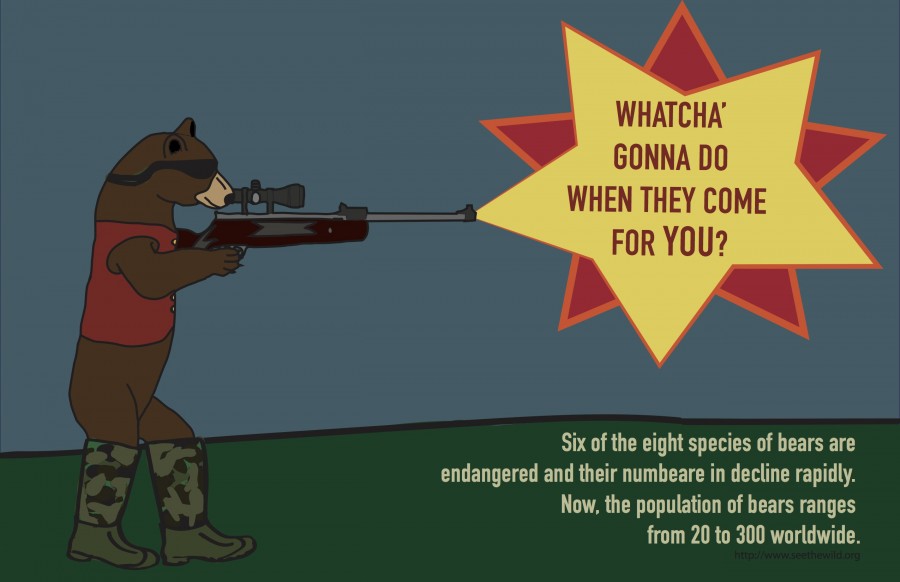Social Issue: Poaching
March 20, 2016
Each year students in Regina Dominican’s graphic design class create a social issue poster that visually conveys an issue they feel strongly about.
I am sure that most Reginites are familiar with the word “poaching” in relation to animals. Many of us have seen commercials, pamphlets, or cartoon representations of elephants being robbed of their tusks, bears for their fur, and so on. However, I was unaware of how volatile the process of poaching is until I started researching it.
It is quite fair to say that poaching is one of the most hostile and inhumane actions a human can do to another living being. Maggie Geoghegan ’16 created her poster in order to familiarize Regina Dominican with exactly how awful poaching is, and what we can do to prevent it.
For those of you who are unaware with the idea of poaching, it is “when an animal is killed illegally,” according to the organization, Do Something. It usually occurs when an animal possesses something that is considered valuable, like fur or ivory. When a part of an animal is a valuable asset (usually monetary), but the animal is protected by endangered species or wildlife refuge laws, hunters will illegally kill and steal the body and/or body parts to sell on the black market. As a result, some of Earth’s most beautiful wildlife populations have plummeted.
Africa has been hit the hardest by far. The African Wildlife Foundation estimates that since 1960, the Black Rhino population has decreased 96%, fewer than 900 Mountain Gorillas remain in the world, and 35,000 African Elephants are poached yearly for a single body part. The vast majority of poaching occurs through organized crime syndicates who use high powered technology and weaponry to mass kill animals without being detected.
Obviously, once an animals is removed from our planet, their species will never return. Future generations will not live on a planet with Mountain Gorillas or Black Rhinos unless our current generation acts now. Since the 1990’s, China has taken a step in the right direction by destroying ivory stocks and consumption in hopes to send a message to the world that ivory trading will not be tolerated. However, regardless of the good intentions, this motion has made little to no impact on poaching.
We are going to need to do much more.
Signing petitions to prove that you stand against animals poaching does more than you might think. With millions of signatures, poachers are ridiculed and lose the power of their business.
To aid elephants, sign Blood Ivory Organization’s petition. To petition for anti-poaching education in schools, sign Move On Organization’s petition.
Donations and volunteer work are also vital to the anti poaching movement. Make sure to donate to non-for profit environmental agencies such as the World Wildlife Federation, Wildlife Conservation Society, or Defenders of Wildlife. You can also volunteer with the International Anti-Poaching Foundation regardless of where you reside in the world.
Regina Dominican’s graphic design class has taken on the task of creating visuals to confront social issues like poaching. Senior Maggie Geoghegan has decided to voice her opinion against poaching as a part of her personal project. Maggie answered some questions regarding the topic.
Q: Why is this topic important to you?
A: “Because if you think about it, if all of the animals go extinct, then we will too eventually.”
Q:What are you trying to accomplish with this visual?
A: “There is a reason why poaching is illegal. We shouldn’t do it. I want Regina students to take a stand against poaching and get the message out. There are so many ways to take a stand.”
Q:What was your inspiration?
A: “My uncle lives in Minnesota. He’s a big hunter and fisher. We always get into big arguments, and in a way I wanted to prove something to him.”
Q: Can you explain your visual?
A: “The bear is my uncle Pete (the one who likes fishing and hunting). I reversed the roles to the viewer would think ‘what if you’re the one being hunted? How would you feel?’ ”


